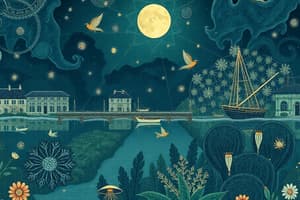Podcast
Questions and Answers
What is the term sometimes used to refer to the large ice masses at the poles?
What is the term sometimes used to refer to the large ice masses at the poles?
- Polar Icecap (correct)
- Mountain Glacier
- Ice Sheet
- Watershed
What drives the water cycle?
What drives the water cycle?
- The ocean currents
- The Earth's rotation
- The Sun's thermal energy (correct)
- The wind patterns
What is the process of water changing from a liquid into water vapor?
What is the process of water changing from a liquid into water vapor?
- Melting
- Sublimation
- Evaporation (correct)
- Freezing
What is the process of water vapor changing directly into a solid without becoming a liquid first?
What is the process of water vapor changing directly into a solid without becoming a liquid first?
What is a watershed?
What is a watershed?
What happens when water is cooled in the atmosphere?
What happens when water is cooled in the atmosphere?
What is the process of solid ice becoming liquid?
What is the process of solid ice becoming liquid?
What is true about the water cycle?
What is true about the water cycle?
What percentage of Earth's supply of water is saltwater?
What percentage of Earth's supply of water is saltwater?
What happens to salt in saltwater when it freezes?
What happens to salt in saltwater when it freezes?
What is the groundwater zone?
What is the groundwater zone?
What is an aquifer?
What is an aquifer?
What happens to groundwater when it reaches the surface in a desert?
What happens to groundwater when it reaches the surface in a desert?
What percentage of the Earth's supply of water is freshwater that we can drink?
What percentage of the Earth's supply of water is freshwater that we can drink?
What is the state of all solid water (frozen) on Earth?
What is the state of all solid water (frozen) on Earth?
What is the upper surface of the groundwater zone called?
What is the upper surface of the groundwater zone called?
Flashcards are hidden until you start studying
Study Notes
Earth's Supply of Water
- 97% of Earth's water supply is saltwater, which is undrinkable.
- 3% of Earth's water supply is freshwater, which is the only water suitable for drinking.
Three States of Water
- Water exists in three states: solid (ice), liquid (water), and gas (water vapor).
- When water changes from one state to another, it requires a transfer of energy.
Groundwater
- Most of Canada's freshwater exists underground rather than on the surface.
- Scientists estimate that one-third of the world's freshwater lies underground.
- The groundwater zone is the area where water fills all the air spaces in the soil and rock.
- The upper surface of the groundwater zone is called the water table.
- An aquifer is an underground freshwater reservoir that stores large amounts of water.
- Groundwater is constantly moving and eventually reaches the surface, forming wetlands, rivers, lakes, or oceans.
Ice Sheets and Ice Caps
- An ice sheet is a large glacier that covers the land, with only two existing on Earth (in Greenland and Antarctica).
- Ice sheets are formed on a larger scale, similar to a mountain glacier.
- The term "Polar Icecap" is sometimes used to refer to these large ice masses at the poles.
The Water Cycle
- The water cycle is a continuous process with no beginning or end.
- The sun provides thermal energy that drives the water cycle.
- Water is constantly changing states as it moves from Earth's surface into the atmosphere and back into the Earth again.
- The sun's heat energy drives the water cycle, causing water to change states through evaporation, melting, freezing, sublimation, condensation, and deposition.
Water Cycle Processes
- Evaporation: the process of water changing from a liquid into water vapor.
- Melting: the process of solid ice becoming liquid by adding heat.
- Freezing: the process of becoming ice by losing heat.
- Sublimation: the process of going from solid ice to water vapor without first becoming liquid.
- Condensation: the process of water vapor turning into liquid by cooling.
- Deposition: the process of water vapor changing directly into a solid without becoming a liquid first.
Water Table and Watersheds
- A watershed is an area of land where all the water eventually drains into one main water body, such as a stream, river, wetland, lake, or ocean.
- Activities that affect water in one part of the watershed have an effect downstream in the watershed.
- Small watersheds connect to larger watersheds, forming a network of water systems.
Studying That Suits You
Use AI to generate personalized quizzes and flashcards to suit your learning preferences.




